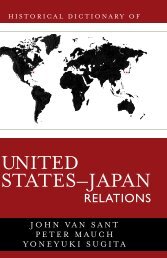Confucian Political Theory in the Face of the Future1 Mon-Han Tsai
Confucian Political Theory in the Face of the Future1 Mon-Han Tsai
Confucian Political Theory in the Face of the Future1 Mon-Han Tsai
Create successful ePaper yourself
Turn your PDF publications into a flip-book with our unique Google optimized e-Paper software.
study<strong>in</strong>g <strong>the</strong> Neo-<strong>Confucian</strong>ism <strong>of</strong> <strong>the</strong> Song and <strong>the</strong> M<strong>in</strong>g, he (1983) argues that<br />
<strong>Confucian</strong> notion <strong>of</strong> moral cultivation and gentleman is actually very compatible with<br />
liberalism. He contends <strong>Confucian</strong>ism has a long ‘liberal’ tradition aga<strong>in</strong>st <strong>the</strong> tyranny,<br />
unlike many has asserted o<strong>the</strong>rwise. He cont<strong>in</strong>ues his reth<strong>in</strong>k<strong>in</strong>g <strong>of</strong> <strong>Confucian</strong> political<br />
<strong>the</strong>ory <strong>in</strong> ‘The Trouble with <strong>Confucian</strong>ism (1991)’ <strong>in</strong> which <strong>Confucian</strong> <strong>the</strong>ory <strong>of</strong><br />
gentleman, sage-k<strong>in</strong>g and people is thoroughly exam<strong>in</strong>ed and appraised. He<br />
acknowledges <strong>the</strong> democratic deficit <strong>in</strong> <strong>Confucian</strong> political th<strong>in</strong>k<strong>in</strong>g, but he does not<br />
regard this as a sufficient reason to discredit <strong>Confucian</strong>ism, because <strong>Confucian</strong>ism has<br />
deep care and strong sense <strong>of</strong> responsibility for people’s welfare. In relation to it,<br />
<strong>Confucian</strong> notion <strong>of</strong> <strong>the</strong> sage-k<strong>in</strong>g and nobleman <strong>in</strong>spires high standard <strong>of</strong> code <strong>of</strong><br />
conduct <strong>in</strong> public life. Fur<strong>the</strong>rmore, when his translation <strong>of</strong> Wait<strong>in</strong>g for <strong>the</strong> Dawn by<br />
Huang Zongxi (1610-1695) was published <strong>in</strong> 1993, <strong>in</strong> <strong>the</strong> <strong>in</strong>troduction he (1993) praises<br />
Huang as Ch<strong>in</strong>ese Rousseau and hails <strong>the</strong> book as a v<strong>in</strong>dication <strong>of</strong> <strong>Confucian</strong> protest<br />
aga<strong>in</strong>st tyranny and monarchy 13 .<br />
In his 1998 book ‘Asia Values and Human Rights-A <strong>Confucian</strong> Communitarian<br />
Perspective’, he weighed <strong>in</strong> <strong>the</strong> <strong>the</strong>n very hot topic ‘Asian Values’ and <strong>of</strong>fered his own<br />
take on what really constituted Asian Values. By <strong>the</strong>n liberalism had fallen out <strong>of</strong><br />
favour and communitarianism was seen by many as a corrective to liberal atomism 14 .<br />
Rely<strong>in</strong>g on his knowledge <strong>of</strong> <strong>the</strong> Neo-<strong>Confucian</strong>ism, he f<strong>in</strong>ds many ideas and practices<br />
such as community pact and school proposed by <strong>the</strong> Neo-<strong>Confucian</strong>s <strong>of</strong> <strong>the</strong> Song and <strong>the</strong><br />
M<strong>in</strong>g period not dissimilar to communitarian th<strong>in</strong>k<strong>in</strong>g. In <strong>the</strong> Afterward <strong>of</strong> <strong>the</strong> book<br />
(1998, pp158-167), he defends that his borrow<strong>in</strong>g <strong>of</strong> ‘liberalism’, ‘constitutionalism’ and<br />
‘communitarianism’ is not to say <strong>the</strong>se values are <strong>in</strong>tr<strong>in</strong>sically higher than <strong>Confucian</strong><br />
political values and he merely hoped to draw attention to <strong>the</strong> fact that <strong>Confucian</strong><br />
political <strong>the</strong>ory has a very rich and complex tradition and is not alien to <strong>the</strong>se Western<br />
ideas. Despite his strenuous exertion to return <strong>the</strong> political to <strong>Confucian</strong>ism, de Bary<br />
has never contemplated <strong>Confucian</strong> political <strong>the</strong>ory as a possible alternative to Western<br />
political imag<strong>in</strong>ation, <strong>the</strong> fact, he cont<strong>in</strong>ues to use Western political terms, despite his<br />
caveat, is a good <strong>in</strong>dication. At any rate, it is fair to say de Bary is <strong>the</strong> first one s<strong>in</strong>ce <strong>the</strong><br />
collapse <strong>of</strong> Japan’s Sh<strong>in</strong>to-<strong>Confucian</strong> state, to take <strong>Confucian</strong> political <strong>the</strong>ory seriously<br />
aga<strong>in</strong>.<br />
13 He also reiterated <strong>the</strong> ma<strong>in</strong> po<strong>in</strong>ts about Huang’s book <strong>in</strong> his 1998 book and accentuated Huang’s<br />
ma<strong>in</strong> arguments as ak<strong>in</strong> to constitutionalism, representative government and <strong>the</strong> autonomy <strong>of</strong> civil<br />
society.<br />
14 Walzer, Sandel, MacIntyre and Etzioni just to name a few and it important to recall many <strong>of</strong> <strong>the</strong>ir<br />
works were published <strong>in</strong> <strong>the</strong> 1980’s and 1990’s.<br />
13













